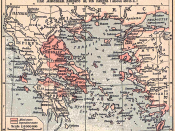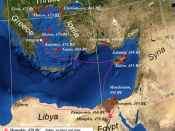The formation of the Delian League - with Athens at its head - came about due to a complex of factors, among which was the fear of the imminent return of Persia.
Despite the victory Greece had against Persia in 479 BC, the Greek attitude toward Persia after this victory was still one of fear.
The Persians had essentially set a precedent for the Greeks: they kept coming back. (This fear was not unjustified; it was rather based in reality, as the Persians did indeed come back later, on more than one occasion.)
Hammond wrote that "the differences between Sparta and Athens were overshadowed by the common danger, Persia."
It is reasonable to believe that mainland Greece might have been seen as the safest part of Greece after the war against the Medes because the mainland states were the farthest away from Persia.
In the Eastern Aegean, the states that had rebelled against the Persians before would probably have felt a great deal of trepidation.
If this is true, those states must have felt desperation for continued protection from the mainland.
The fear of Persia was not, of course, the only reason for the formation of the League. The allies on the eastern Aegean and their own fears and feelings had much bearing on the formation of the new League.
Thucydides asserts that Pausanias had become arrogant and unpopular with the Hellenes. Pausanias was "trying to set himself up as a dictator." Thucydides also says that Pausanias was charged with collaboration with the Persians.
Plutarch says that Pausanias and the other Spartan commanders behaved harshly and offensively to the allies, as well as treated the allied commanders with arrogance and ill temper. Surely the allies would have been less than impressed with Sparta's performance as leader.
In the Eastern Aegean,



Good paper
I just took a class on ancient Greece and this paper did a great job on sumarizing the formation of the Delian League in a short amount of space. Well done.
5 out of 5 people found this comment useful.